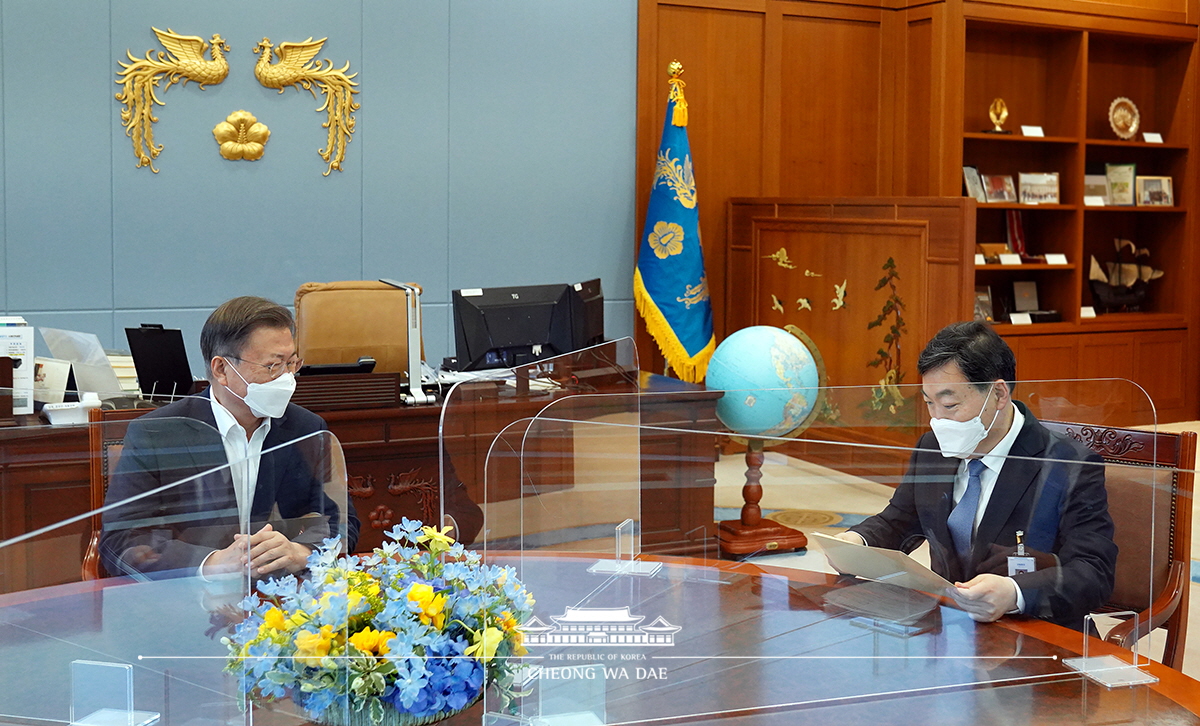Moon’s strategic ambiguity on prosecutor reform
President Moon had a meeting with the Prosecutor General, who submitted his resignation in protest of Minjoo’s prosecutor reform, known as the complete deprivation of the Prosecutors’ investigation authority.
Moon’s message, delivered by his spokesperson, was so cryptic that each media has its own interpretation of it.
- Dong-A: without clarifying his position on the reform bill, Moon tried to mediate between the Prosecutors and the Minjoo Party
- Joongang: Moon empathizes with the reform
- Chosun: Moon didn’t reveal his position on the reform while requesting the Prosecutors’ self-reflection
- Hankook: Moon wants Minjoo to slow down
- Hankyoreh: Moon agrees with the reform in principle but sends a warning to Minjoo to slow down
- Kyunghyang: Moon warns both the Prosecutors and Minjoo
It is not hard to imagine the reason behind his strategic ambiguity. While signing the reform bill, which still needs to get through the Assembly, would be beneficial for him in the short term since he would be get away from the allegations he’s getting, the pandemonium in the aftermath may haunt him for the rest of his life.
And even if the reform succeeds, the next President can employ whatever in his sleeve (and, remember, President’s sleeve is vast) to go after his predecessor’s wrongdoings.
However, Moon will have to make a decision soon. Minjoo is adamant, and at the end of the day, the buck stops with him, not anyone else.
Yoon is having his own Cho Kuk moment
Yoon’s pick for the health minister Chung Ho-young is in the limelight regarding his children’s medical school admission.
While it doesn’t look as brazen as Cho Kuk’s case, it has the potential and similarities to be as inflammable as Mr. Cho’s, which was the beginning of Moon’s political downhill:
- Stirring people’s sense of unfairness with the so-called “gold spoon” children of the elite
- The leader, who’s known to have a personal affection for the man in question, giving out a bad impression by seemingly advocating for him
People wouldn’t see much difference between what Yoon said (that “clear facts about irregularities” should first be confirmed) and what Moon said (“it would make a bad precedent if I don’t appoint him because of mere suspicions”).
It would be fitting to look back on what happened to Cho and Mr. Moon.
Cho, who used to be one of the closest to the next presidency (even he himself mused on the possibility in an awful trope), had to step down and is currently waiting for the court to decide whether he will follow his wife, who is serving a prison sentence.
With Mr. Cho stepping down, the Moon administration lost a significant portion of its moral capital and foreign audience had to learn what ‘naeronambul’ means.
The best move for Yoon would be to drop Chung and ask Ahn Cheol-soo, who’s been sullen after watching none of his recommendations being nominated, for a recommendation.
PPP is in the lead for June election but how long will it last?
The People Power Party has the upper hand so far in the June local election.
For the next Seoul mayor, none of the Minjoo candidates stand a chance against the incumbent mayor Oh Se-hoon, last week’s poll found.
The gap between Minjoo and PPP is narrower for the Gyeonggi governor, but it looks like the PPP primary will be a more close competition between Yoon’s spokesperson Kim Eun-hye and conservative veteran Yoo Seung-min.
Of course, it is too soon to tell, specifically when both parties are busy shooting themselves in the foot, with Minjoo pushing for the Prosecutors’ reform and PPP making bad choices in appointing the ministers.
Why BTS label’s first girl group has no Chinese member
This is not related to South Korean politics, but I think it might serve as an allegory for what South Korea’s foreign relations are going to be like.
Hybe’s very first K-pop girl group Le Sserafim is soon to debut. Interestingly, there are no Chinese members, while there are two Japanese and one American members.
Multinationalism has been one of K-pop’s marketing gimmicks for a long-time. Lisa of BlackPink is a glaring success case, and SM Entertainment even had a boy group subunit dedicated to the Chinese market.
Employing Chinese members had been all the rage, but now it’s hard to find Chinese members in K-pop groups making their debut. What happened?
It has little to do with racism or Beijing’s foreign relations approach though some members made controversial comments in line with Beijing’s official line. It is more about China having a much greater market.
It doesn’t make much sense to the Chinese members of K-pop groups to keep up with their group as soon as they get enough recognition since the Chinese entertainment market is bigger than the Korean market.
Exo is one notable example. Out of the original 12 members, three Chinese members left the group, and one Chinese member didn’t extend his contract with SM Entertainment.
This is a severe loss to the labels as they invest a lot to train the talents. I speculate that the K-pop labels began to realize the risks of employing Chinese members, and the number of Chinese members is in decline. (I’m thinking of tracking all the K-pop groups that debuted since 2010 some time)
What’s more important to me is that this won’t be much different regarding economic relations between South Korea and China. As China tries to catch up with developed economies, including SK, the traditional ROK-PRC economic relation in the frame of the global value chain will soon face a seismic change. This is basically what China’s dual circulation strategy is about.
